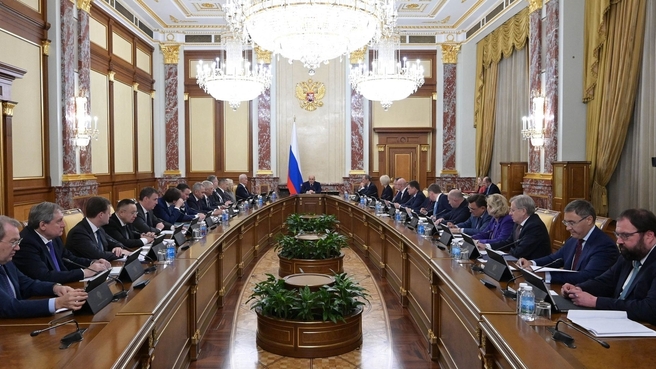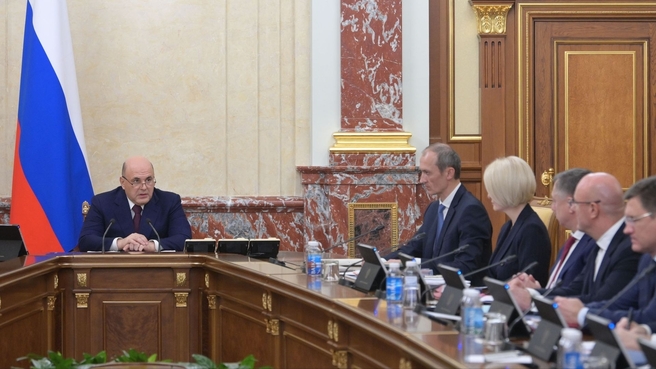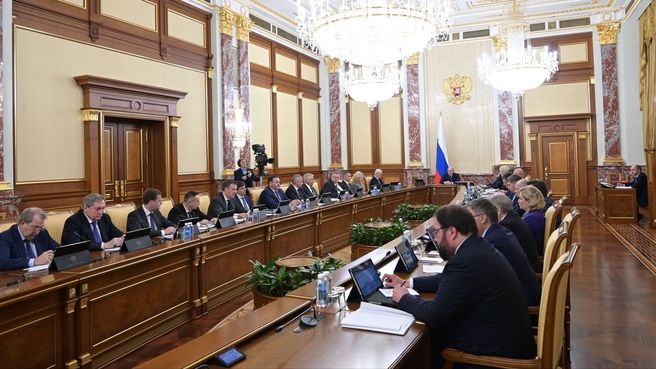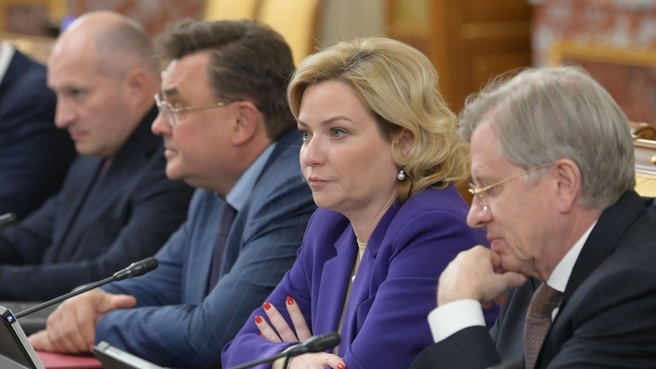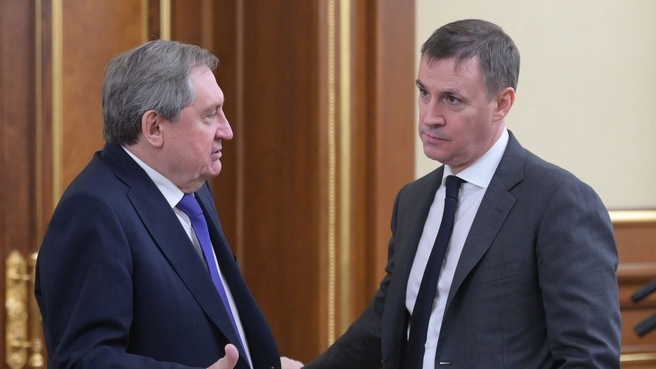Agenda: results of the working visit to Kyrgyzstan, mortgage subsidies for families with many children, new initiatives for the development of private housing construction, expansion of measures to support long-term savings of citizens, and harvesting results.
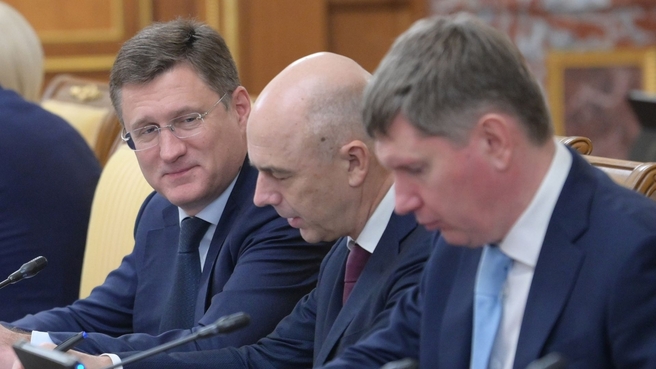
Alexander Novak, Finance Minister Anton Siluanov and Economic Development Minister Maxim Reshetnikov at a Government meeting
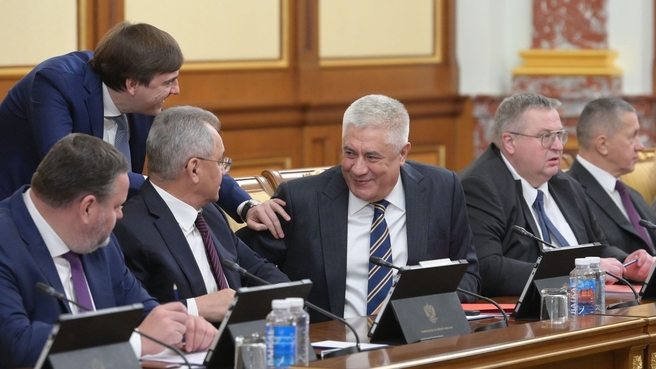
Minister of Labour and Social Protection Anton Kotyakov, Minister of Education Sergei Kravtsov, Minister of Defence Sergei Shoigu, Minister of Internal Affairs Vladimir Kolokoltsev, Alexei Overchuk and Yury Trutnev at a Government meeting
Government meeting
Excerpts
from the transcript:
Mikhail Mishustin: Good afternoon, colleagues.
Before we move on to the agenda for the Government meeting, I would like to say a few words about our trip to Bishkek, Kyrgyzstan.
They hosted a meeting of the Heads of Government Council of the Shanghai Cooperation Organisation. It is absolutely clear that interest in this organisation is growing in the world. As the President noted at the July summit, the SCO is playing an increasingly important role in international and regional affairs, in ensuring sustainable economic growth of its member states, and in strengthening ties between peoples.
We discussed further steps to deepen trade, economic, cultural and humanitarian cooperation. We have adopted a number of sector-specific documents, including in the area of digital trade and transport.
We have also held meetings of the Eurasian Intergovernmental Council and the Council of Heads of Government of the CIS involving our close neighbours. We are paying particular attention to strengthening contacts with them.
We reviewed the progress in implementing the priorities of the Russian chairmanship of the Union, which were outlined by the President. As one of the main tasks, we consider the development of a new strategic document that will outline the guidelines of co-operation between the five nations for the future.
My colleagues and I have finalised a declaration on the further development of economic processes within the EAEU, The Eurasian Economic Path. The document will be discussed and adopted by our heads of state.
Another important area is the start of subsidising integration projects at the expense of the Union budget. We have assessed the progress in preparing the relevant regulatory framework.
We also approved the rules of mutual trade in electricity within the framework of the Eurasian Economic Union and agreed to define and distribute the capacity of interstate infrastructure. This is necessary for the development of our common electricity market.
An important event was the signing of the Agreement on a harmonised system for determining the origin of goods exported from the customs territory of the Union. It will simplify access for exporters to the markets of third countries.
Speaking about the Commonwealth of Independent States, together with our partners in the organisation, we touched upon such topics as the exchange of geospatial data and the digital transformation of fuel and energy industries. We adopted a concept in this area and a plan of priority measures for its implementation. This will help expand mutually beneficial cooperation and introduce specialised digital platforms.
We will also continue to strengthen people-to-people ties, including through building a system of sports competitions. We have talked about this in detail.
We also approved the action plan for next year’s Year of the Volunteer Movement. It will be inaugurated in Russia in early December.
Colleagues, I ask you to keep a close eye on how all the decisions made in Kyrgyzstan in the areas you supervise are being implemented.
Let’s move on to the agenda.
The Government continues to help parents with many children. The President has stressed that this issue is among our top priorities.
One such targeted and effective support measure is for families who had a third or subsequent child born after 1 January 2019. If they have taken out a mortgage loan, they can get a lump sum of up to 450,000 roubles to repay the mortgage. In the current year, we have already allocated around 76 billion roubles for this.
Today, we will release more funds – over 17 billion roubles, which will help support about 38,000 more families who purchased a more spacious flat, a house or a plot of land for building one.
We will keep doing everything needed for our citizens to have an opportunity to improve their housing conditions.
We will also be discussing new initiatives for the development of private housing construction.
We have achieved very good results in the past years in building high-rises and reached record-high rate of progress. Almost 32 million square metres of housing were completed in the first nine months of this year, which is 5.5 percent more than in the same period last year. We have made new flats more affordable and made dealings with developers as transparent and safe as possible.
It is essential to spread best practices in individual housing construction as well. To do that, acting on the President’s instruction, the Government has drafted a federal law on the use of so-called escrow accounts for payment of services for their construction. These accounts are used for safe real estate transactions. Today, we will also consider a draft law which guarantees the safety of deposits up to 10 million roubles as part of the deposit insurance system. We will also discuss amendments to the Tax Code which exempt contractors from paying VAT.
In essence, it amounts to creating a mechanism of project financing in the private housing construction segment similar to the mechanism for professional contractors. This will make it possible to attract major construction companies to this sector and cut the costs associated with building individual houses.
The next issue is related to expanding support for citizens’ long-term savings.
The President stressed the importance of providing people with opportunities to invest and grow their money at home, inside their country.
Today we are going to review a draft law which allows for the use of a number of effective instruments including individual investment accounts. They are used to purchase shares, bonds, currencies and precious metals. The return on the funds invested in them come in the form not only of money but also some tax perks.
The new programme will be launched as of next January and will combine the advantages of the previous financial products. They include a tax deduction with an annual yield of up to 52,000 roubles. No personal income tax on the investment income will be paid on that.
Moreover, citizens will be able to open up to three accounts with no limits on the amount of monetary assets and will be able to withdraw them in full or part in cases where medical treatment is needed.
We expect that the measure to be taken will allow people to maintain and grow their savings and ensure a stable income for those who want to invest in the Russian economy.
Today’s agenda also includes the results of the harvesting campaign.
We are to assess the current state of food security and determine priorities in order to provide agribusiness with the necessary state support next year.
As the President noted, the industry has become one of the real drivers of the domestic economy, and our exporting companies are global leaders in a number of areas.
Preliminary results of seasonal field work fully confirm this. The production of oilseeds, sugar beets, potatoes, vegetables in open ground and in greenhouses, fruits, and berries has noticeably increased. Over 140 million tonnes of grains and grain legumes have been threshed. We expect a second record harvest, which will be enough for both consumers in the domestic market and our partners abroad.
Winter crops for next year’s harvest are being sown according to the plan. The volume of domestic seeds is growing. More mineral fertilisers were purchased than in 2022.
The technological upgrade of the agricultural machinery fleet continues. This year, farmers have already received about 2,000 Russian and Belarusian tractors. There are plans to supply another 13,000 units of machinery and equipment on lease by the end of the year.
I would like to note that resources are provided to agricultural producers on time, often ahead of schedule, including funds to upgrade facilities as part of the implementation of the federal project on agricultural exports and to increase the production of potatoes and vegetables, as well as to develop rural tourism and other measures. We can see the same responsible approach on the part of the regions of our country.
I invite Minister of Agriculture Dmitry Patrushev to report on this in more detail. Mr Patrushev, take the floor, please.
Dmitry Patrushev: Thank you.
Mr Mishustin,
Colleagues,
The seasonal field work is nearing completion. Cereals have been threshed from the 94 percent of the crop area. Harvesting of wheat, buckwheat and rice is in the final stage. Maize is being actively harvested.
As you said, Mr Mishustin, we expect that according to the final data, Rosstat agency will confirm the harvest of 140 million tonnes in net weight, with wheat accounting for about 93 million tonnes. This will be the second best result in our country’s history which will satisfy the domestic market and will make it possible for us to fully deliver on our export commitments.
Thus, in the current agricultural season we are prepared to export up to 65 million tones of grain.
Furthermore, the yields of other agricultural crops will be higher than the average of the past five years.
The yield of oilseeds it expected at 27 million tonnes, sugar beets at 50.5 million tonnes, potato harvest from non-homestead producers will be around 8 million tonnes, and vegetables – approximately 7.3 million tonnes. And lastly, we expect to harvest 1.7 million tonnes of fruits and berries.
Autumn sowing for the 2024 harvest has been completed on 18.5 million hectares to reach nearly 20 million by the year’s end, which is about 1.5 million hectares more than last year.
Sowing is being actively conducted in the south, the North Caucasus and in the new regions. The weather has been far from favourable there so far with a shortage of precipitation. Nevertheless, we expect to meet the targets.
Regarding the provision of farmers with material and technical resources, there is a sufficient amount of seeds for autumn sowing. I would like to note that the share of seeds of Russian provenance is systematically increasing.
Rosagroleasing preferential programmes for the renewal of agricultural machinery continue to be in effect. As of today, 12,400 units have already been delivered which is 2,700 more than on the same date a year ago. Under the plan, 13,000 units of machinery will be delivered in 2023.
I should add that now preferential leasing is also available in new regions. More than 300 tractors, combine harvesters and other equipment have already rolled out into the fields.
Apart form that, together with the Ministry of Industry and Trade we are implementing a plan to purchase Russian and Belarusian tractors which provides for discounts of up to 20 percent on the most popular models. In 2023, more than 4,000 tractors are to be purchased using this tool.
Under a separate plan, we continue the monitoring of fertiliser purchases. Since the beginning of the year, farmers have purchased 4.5 million tonnes. In 2023, the total volume should reach about 5.4 million tonnes, which is 200,000 tonnes more than in 2022.
Export quotas for certain types of fertiliser are maintained and producer prices are frozen so as to ensure stability in the fertiliser market. These measures have been agreed to be in effect until the end of November.
Mr Mishustin, we are now working out, together with our colleagues from the Ministry of Industry and Trade, Ministry of the Economic Development and Federal Anti-Monopoly Service, how to extend the measures for another six months.
And finally, about fuel and lubricants. Thank to the action taken, there is no shortage of fuel for farmers. Prices are gradually going down. Nevertheless, we continue monitoring them alongside the Ministry of Energy and the regions.
Colleagues, this year, 116 billion roubles have been allocated directly to the constituent entities to support farmers. To date, the recipients have received about 87 percent of this amount. Thanks to the advance payment of costs, the figure is higher than in previous years.
And just a few words about separate mechanisms which are relevant to crop production.
First, we continue to expand agricultural insurance. This year more than 5 billion roubles have been allocated to this end. This area shows annual growth. Currently, 7.7 million hectares have already been insured. And the figure will be further increased due to the area under winter crops.
Second, soft loans continue to be issued.
Mr Mishustin, I would like to thank you once again for the additional allocation of 55 billion roubles for these purposes. As a result, we were able to increase the credit line for short-term loans by 35 percent. And these loans are especially important for crop growers during the seasonal fieldwork period.
Let me move on. High grain yields in the last two years have affected the price situation in this segment, so another 10 billion roubles are being allocated for targeted support of producers. We will give them to the agricultural producers by the end of the year. I would like to remind you that this is the third tranche in 2023. The total amount of support for grain producers at the end of the year will amount to 30 billion roubles. And another 10 billion are to be allocated to them in the first half of 2024.
In addition, by the end of November, we will be ready to launch grain interventions. We will buy up to 2 million tonnes. Starting prices will be somewhat higher than the current market prices.
Colleagues, to sum up, the seasonal field work is proceeding as planned.
At the same time, we have intensified preparations for the 2024 sowing season.
Regarding seeds, we focus primarily on Russian ones. In particular, there is a special plan for sowing domestic seeds for each region, and it will be augmented every season.
Concerning fertiliser purchases, everything is normal. The work has been set up.
Our farmers will also be provided with crop protection agents, we do not see any significant risks here. We also advise the regions to use Russian-made agents.
And of course, the composition of the sown areas for the next period will be approved before the year’s end. This practice was introduced by us in 2022.
This approach lets us plan seasonal field activities more efficiently as well as to meet estimated production figures.
Mikhail Mishistin: Thank you, Mr Patrushev. During a recent meeting with the Government, the President stressed precisely the importance of strengthening technological sovereignty in agriculture. This includes stepping up domestic breeding and selection, genetics for animal husbandry and crop cultivation as well as the production of veterinary vaccines inside the country.
I ask you to take it under your personal supervision and look into which areas need special support.
Particular attention should be paid to the availability of mineral fertiliser for our farmers. I know that you are working on this. We already have experience and mechanisms for this. I ask both the Ministry of Agriculture and the Ministry of Industry and Trade to finalise the issue of export quotas for certain types of fertiliser and price caps and promptly submit the relevant decisions to the Government.
These factors should be taken into account in the future spring sowing season to ensure that new yields are as good as the current ones and prices remain stable. This should be done on a systematic basis
We expect that the state support for the agricultural industry will make it possible to provide our citizens with high-quality food in future as well.
